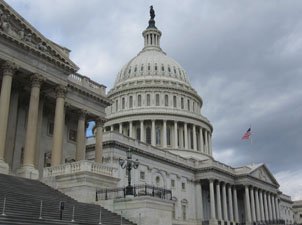
What Congress Needs To Do Before 2020
Ness Perry
December 11, 2019
December is shaping up to be a big month for Congress. Before the end of the year, there are a few crucial issues they must act on.
Funding the Government
Congress has until December 20, 2019 to prevent a shutdown. Last year’s government shutdown hurt government employees and hindered federal spending alike. A budget for FY 2020 must be confirmed before December 20 or risk another shutdown.
While the House allocated zero additional funds for DHS border enforcement, the Senate’s funding bill includes a $5-billion-dollars for additional border enforcement. We applaud the House for putting human rights first by voting to allocate no additional funds to DHS. Senate Democrats also voted against giving more money to be DHS. In order to avoid a shutdown, lawmakers must either agree on all 12 spending bills (including DHS) or pass another continuing resolution (CR). A full year CR would result in $100 billion dollars less in funding for federal programs.
Regarding impeachment, Senate Republicans could use impeachment as a bargaining chip and refuse to vote on a spending bill until their demands on impeachment are met.
Trade
USMCA negotiations have just reached agreement. Speaker Pelosi and President Trump were previously negotiating on mechanisms to enforce labor regulations as well as pharmaceutical companies’ ability to include provisions for biologic drugs, which would make it harder for competitors to put generic versions on the market. Lastly, they had to reach agreement about worker protections. Now that the deal has been made, President Trump needs to sign the agreement before the winter recess so that it doesn’t drag on into 2020.
VAWA Reauthorization
Over six months ago, the House passed H.R.1585, a bipartisan bill to re-authorize and improve the Violence Against Women Act (VAWA). Now, the legislation has reached an impasse in the Senate. Democrats and Republicans have both introduced legislation to reauthorize VAWA (Violence Against Women Act) after attempts to reach bipartisan agreement faltered. Senator Dianne Feinstein (D-CA) introduced a Senate version of the House VAWA reauthorization passed with bipartisan support(S.2843).
This bill closes the “boyfriend loophole,” extending existing gun restrictions to include dating partners, which has attracted opposition from the NRA. The bill also expands protections for LGBTQ+ people and Native Americans. Senator Joni Ernst (R-Iowa) authored her own bill in the Senate, which does not include these provisions. It is unclear if Senators Feinstein and Ernst will come to an agreement before 2020. We must pass VAWA reauthorization to protect and support all survivors of sexual violence and we continue to advocate with them at the center of our politics.
Census
Congress allocated funding for the 2020 Census at $7.3 billion for the year. This amount will apply until the end of the current continuing resolution, on December 20. Congress must act to retain full Census funding in order to make sure everyone is counted.
Health Care
H.R.3. (The Lower Drug Costs Now Act) is expected to get a rules committee markup early this week, and will then receive a full floor vote later on in the week. An amendment by Texas Representative Lloyd Doggett (TX-35)would allow people without insurance to access the lower drug prices negotiated. Through the demand of moderate Democrats in the House, this provision was unfortunately omitted. It is unclear if this amendment will make it into the final version of the bill.
Taxes
We are hoping to see a short-term expansion of credits under the Earned Income Tax Credit and the Child Tax Credit. More than 5 million workers not raising children aged 19-67 would no longer be taxed into, or deeper into, poverty each year. Furthermore, improvements in the CTC to make it fully refundable for all families would lift nearly 2 million children above the poverty line. But, it is unknown at this time if Congress will act before the end of the year.
Immigration
The House Rules Committee will hear the Farm Workforce Modernization Act of 2019 this week, which will establish a special citizenship status for certified agricultural workers. A floor vote of this bipartisan bill is expected on Wednesday afternoon.







